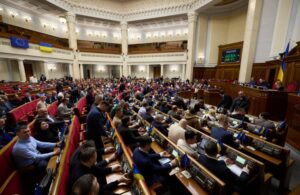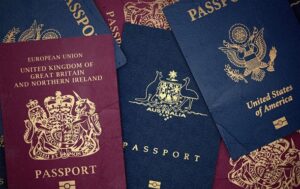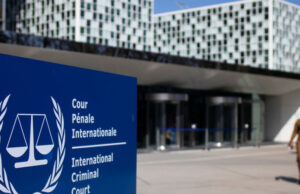
The Committee on Legal Policy recommends that the Verkhovna Rada adopt the draft law (No. 9235) on certain issues of disclosure of banking secrecy and measures to establish custody of the property of a missing person, the press service of the Ukrainian parliament’s apparatus reports.
The draft law proposes to amend the Civil Code and the laws “On Notaries”, “On Banks and Banking” and “On the Legal Status of Persons Missing in Special Circumstances”.
The draft law, in particular, defines the procedure for notaries to establish guardianship over the property of an individual who has been declared missing or a person who has gone missing under special circumstances. The draft law expands the list of persons to whom banks may disclose information constituting bank secrecy. In particular, it provides for its disclosure at the request of notaries to perform a notarial act to take measures to establish guardianship over the property of an individual who has been declared missing or a person who has gone missing under special circumstances.
The adoption of the draft law will allow family members of an individual who has been declared missing or missing under special circumstances to receive a notarized certificate of guardianship over the property of such persons. The law will also ensure the protection of the rights and interests of Ukraine in foreign jurisdictions in cases related to compensation for damage caused as a result of an international armed conflict in the country.
On May 23, the Verkhovna Rada adopted in the first reading a draft law amending certain laws on certain issues of disclosure of banking secrecy.

A revised draft law on tax increases during wartime (No. 11416-d) was registered in the Verkhovna Rada on Friday, the parliament’s website reports.
The text of the draft law on amendments to the Tax Code of Ukraine regarding the peculiarities of taxation during martial law is not yet available on the website.
The draft law is authored by MPs Danylo Hetmantsev and Andriy Motovylovets (Servant of the People faction) and Oleksandr Lukashev (Restoration of Ukraine parliamentary group).
As reported, the Parliamentary Committee on Finance, Taxation and Customs Policy recommended that the Verkhovna Rada adopt as a basis the revised draft law on raising tax rates.
According to Committee Chairman Hetmantsev, the draft law provides for an increase in the military tax rate from 1.5% to 5%, setting the military tax at 1% of income for individual entrepreneurs (IEs) for single tax payers of group III and at 10% of the minimum wage for single tax payers of groups I, II and IV.
LAW, PARLIAMENT, TAX

On Thursday, the Verkhovna Rada completed the internal procedures necessary for the entry into force of the Agreement on Political Cooperation, Free Trade and Strategic Partnership between Ukraine and the United Kingdom in terms of trade liberalization: by 2029, all import duties and tariff quotas in bilateral trade are to be abolished, the Ministry of Economy reported.
It is specified that the agreement will be in effect until March 31, 2029, with the exception of two commodity items – eggs and poultry products, the liberalization of trade with which will be extended for two years – until April 1, 2026.
“Ukraine will also have the opportunity to plan export logistics more flexibly and increase exports of high value-added goods in the future,” the Ministry of Economy believes.
The ministry predicts a revival of trade between Ukraine and the UK and an increase in exports of domestic products traditionally supplied to the British market by domestic producers. In particular, these include flour, grain, dairy products, poultry and semi-finished products, tomato paste, honey, corn, wheat, juices, sugar, etc.
The Ministry of Economy reminded that Agreement No. 3 in the form of an exchange of letters amending the Agreement on Political Cooperation, Free Trade and Strategic Partnership between Ukraine and the United Kingdom of Great Britain and Northern Ireland in terms of commitments to trade liberalization was ratified by the Rada on February 8 this year.

The Verkhovna Rada of Ukraine has adopted in the second reading a draft law on support for the development of viticulture and winemaking, said Acting Minister of Agrarian Policy and Food Taras Vysotsky.
“I am grateful to the people’s deputies for their unanimous support for the development of viticulture and winemaking! Bill 9139 – 311 votes in favor,” he wrote on Facebook.
The draft law “On grapes and viticulture products” (No. 9139), which the government registered in the Verkhovna Rada on March 22, is aimed at implementing the relevant EU regulations on viticulture and winemaking, oenological practices, production of flavored wine products, use and protection of geographical indications of wines.
“At the same time, the purpose of the draft law is to create a unified state information system, the Viticulture and Winemaking Register, which will include information on: grape producers; wine products; vineyards; mandatory declarations and other data on wine products provided for by this law, the entry of which is mandatory, which will ensure effective administration and state support for the viticulture and winemaking industry,” the explanatory note to the document says.
The document envisages the introduction of requirements for the production and circulation of wines, viticulture and winemaking products, and flavored wine products with geographical indications similar to current rules in the EU. In particular, it is not allowed to blend wine produced in Ukraine with imported wine, as well as wines produced outside Ukraine.
The draft law provides for the possibility of state support for viticulture and winemaking within the framework of the general laws “On State Support for Agriculture” and “On Peculiarities of Insurance of Agricultural Products with State Support” without any details, except for the principles of objectivity, equality and proportionality.
The document contains the principles for conducting inspections of wine production from the vineyard to the final product, defines the controlling institutions and their powers, and specifies sanctions, according to the explanatory note.

The Parliamentary Committee on Human Rights, De-occupation and Reintegration of the Temporarily Occupied Territories of Ukraine, National Minorities and Interethnic Relations recommends that the Verkhovna Rada adopt in the first reading the presidential draft law on multiple citizenship (No. 11469).
According to the press service of the Verkhovna Rada’s apparatus, this decision was made at a meeting of the committee on Tuesday.
As previously reported, President of Ukraine Volodymyr Zelenskyy submitted draft law No. 11469 “On Amendments to Certain Laws of Ukraine on Ensuring the Exercise of the Right to Acquire and Retain Ukrainian Citizenship” to the Verkhovna Rada.
According to the explanatory note to the draft law, the goals and objectives of the draft law are to update the legal regulation of Ukrainian citizenship, taking into account the need to ensure national security and national interests of Ukraine.
The draft law also simplifies the procedure for acquiring Ukrainian citizenship and improves the regulation of the legal status of foreigners and stateless persons who, in accordance with the procedure established by the legislation of Ukraine, are performing/have performed military service under contract in the Armed Forces of Ukraine, the State Special Transport Service, the National Guard of Ukraine or are one of the spouses of such a person or a child of such a person.
It is noted that the adoption of this draft law will expand the opportunities for certain categories of foreigners and stateless persons to acquire Ukrainian citizenship. At the same time, multiple citizenship will not be introduced for people with Russian citizenship or citizens of states that do not recognize the territorial integrity and sovereignty of Ukraine.

The Verkhovna Rada has ratified the Rome Statute of the International Criminal Court.
The corresponding bill No. 0285 on the ratification of the Rome Statute of the International Criminal Court and amendments to it as a whole was voted for by 281 MPs at the plenary session of the Verkhovna Rada on Wednesday, Oleksiy Honcharenko, a member of the European Solidarity faction, said in a Telegram message on Wednesday.
Ukraine ratified the Rome Statute with declarations on the procedure for relations with the ICC and for seven years after the Rome Statute enters into force “does not recognize the jurisdiction of the International Criminal Court over its citizens for crimes under Article 8 of the Rome Statute” (war crimes).
The draft law confirms Ukraine’s recognition of the ICC’s jurisdiction over crimes against humanity, genocide and war crimes since November 21, 2013, and declares recognition of the ICC’s jurisdiction over the crime of aggression since July 17, 2018 (the date of entry into force of the amendments adopted by the Assembly of States Parties to the Rome Statute in Kampala on the crime of aggression).
As noted in the explanatory note to the draft law, ratification of the Rome Statute will allow Ukraine to become a full member of the International Criminal Court. After the Rome Statute enters into force, Ukraine will participate in the work of the Assembly of States Parties to the Rome Statute and will be able to submit candidates for the election of judges and prosecutors to the ICC. Membership in the Rome Statute will help prevent and deter the commission of particularly serious crimes in the future. Ukraine will be able to effectively cooperate with the ICC, which will help ensure that those responsible for particularly serious crimes that are of concern to the international community are punished.